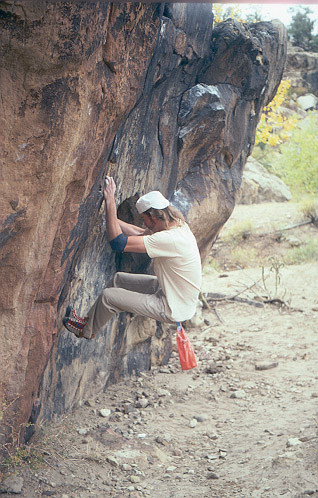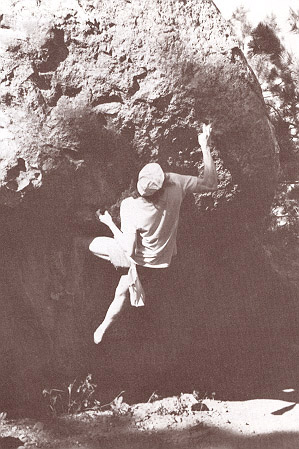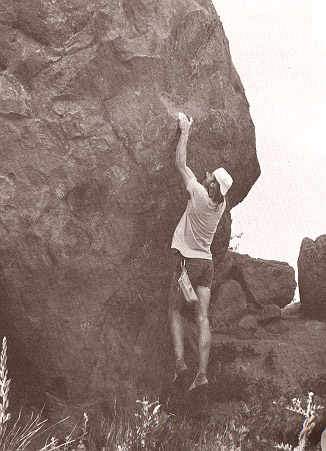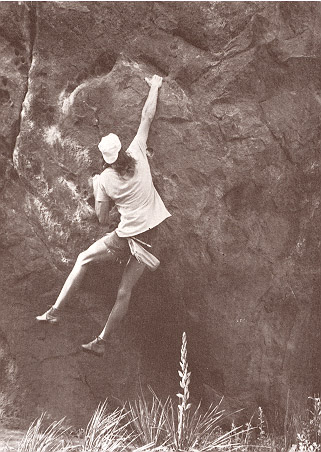www.johngill.net
Bouldering Companions
 Jim Holloway – An
American Bouldering Superstar.
Jim Holloway – An
American Bouldering Superstar.
Jim began bouldering at the age if 16, as a high school student
in Boulder, Colorado in 1970. He and his friends spent hours on Flagstaff
Mountain - sometimes during the school day - carefully moving up the standard
routes using traditional static technique. Then Jim met Bob Williams, a
mathematics graduate student at CU, who had developed a controlled dynamic
style, unlike anything Holloway had seen. He was fascinated by Bob's smooth
acrobatics and began to develop his own dynamic technique, the consequence
of which is a collection of routes that, although done 30 years ago, are
near the top of the current difficulty scale.
In 1972 Jim and Bob drove down to Pueblo to visit me. We bouldered
on a private ranch on the Huerfano River southeast of town - an area Pat
Ament called the Lost Canyon. I
was greatly impressed by Holloway's measured and graceful climbing style,
which might not have been unusual for a talented climber 5'4" tall, but
Jim was almost 6' 5", slim and powerful with a great wingspan and powerful
grip. Incidentally, he rarely "crimped" on small holds, but used an open-hand
style, gaining friction with his palm.
Penny Ante in Lost Canyon, mid 1970s
On later visits, Jim and I worked on problems in the
foothills to the west of Pueblo, notably on the Fatted Calf (again, unfortunately,
on private land), where Jim put up a 'stretcher' on the left side of the
overhanging face that utterly defeated me. In order to try to keep up with
the precocious 'youngster', (a painful and impossible task), I made several
exhausting return visits, finally doing the Groove on the right side of the face, which Jim climbed on a return visit to Pueblo.
Scott Blunk may have climbed Jim's route on the left side – I'm not
sure. But if not Scott, then it probably hasn't been repeated. A not-untypical
scenario for Holloway accomplishments.
With a copy of Master of Rock as a guide, Jim
traveled to midwestern areas where I had established some of the first modern
American bouldering problems, repeating them in what I am sure was impeccable
style and ease. He also engaged in a bit of the gymnastics I had encouraged,
executing a flawless front lever held for almost 30 seconds – about 20 seconds
longer than I ever did!

The midwestern excursion was essentially his only climbing trip
outside Colorado – there was plenty to be done in the state, and by the
time he hung up his climbing shoes around 1980, he had created problems
so demanding that few climbers have ever been able to repeat them. One in
particular – Slapshot,
on Dinosaur Mountain – done in 1977, had not been duplicated by 1994, and
may still be unrepeated. In terms of difficulty - which Jim characterized
as 'easy', 'medium' or 'hard' – Slapshot ('hard') may be V13 or so.
AHR
Cloud Shadow
His routes on Flagstaff and at Morrison and Fort Collins are nearly
as inaccessible to most expert boulderers. A.H.R. (another
Holloway route) on Flagstaff is perhaps the hardest problem there, and it
also was done in the mid 1970s, although later Jim critiqued it as contrived
and a product of competitive spirits not yet tempered by experience and wisdom.
Here are more photos of Jim ( Jim1 , Jim2 ) on Penny Ante Boulder in Lost Canyon in
the mid 1970s. In the second photo, Jim Michaels - Holloway's frequent climbing
partner - is standing to the right. Here's Holloway on my Juggernaut problem in the same area ( Juggernaut1
, Juggernaut2
, Juggernaut3
).

The B&W photos posted on this page are of Jim on Flagstaff
Mountain (from Pat Ament's A Climbers Playground:
A Guide to the Boulders of Flagstaff Mountain,
1980)
Just Right
Capstan
John Bachar says that Holloway may have been the smoothest climber
he's ever seen, and I hold the same opinion. He was incredibly graceful
and precise, and as light as a feather on the rock. Unfortunately, the
only film footage ever taken of Jim in action was Pat Ament's Silent Climber, which
focused more on my performance. But if you can find one of the original videos
- not the short version that came out later - you can watch Jim and several
other boulderers as they weave their spells on Flagstaff.

In 1959, on a trip to Devil's Lake, a British climber, Dave Pullin,
told me, "The top
rock climbers are always short men
(both Joe Brown and Don Whillans were 5'4") , then there's the second
tier of experts, still very good, but not quite up to the standards of
the first group - they are tall and slim." I think Dave, in a droll
and sly way, wanted to put me in my place! I wonder what he would
have thought of the fabulous Holloway?
Direct South Overhang
Capstan
. . .
Holloway Direct
Cloud Shadow